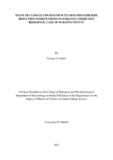| dc.description.abstract | The objective was to study the impact of increased disaster risk reduction activities on the community’s resilience to the negative impacts of a changing climate for sustainable livelihoods.
The study survey was done between June 1st and 30th 2013 in Makueni County, which borders Machakos to the northwest, Kitui to the west, Taita Taveta to the south and Kajiado to the east. The county covers an area of 7,965.8 km2, and has a population of 883, 671 people as per the 2009 national census, and an average household size of 5.9 persons.
The study found that 98.4% of the households do not have access to sufficient water during a drought, 61.5% of the population do not have alternative rainwater harvesting structures. There is need for increased water based disaster risk reduction activities to improve the quantity and quality of water available to the community.
The study found that 86.1% of the households do not have enough food during a drought and 88.6% have not adapted to the use of drought resistant agricultural practices, despite the county experiencing regular droughts. Better approaches to farming techniques should be introduced to the communities to improve on food security.
The study found that 89.4% of the households had minimal understanding of their health status, improved medical facilities should be established and be accessible to the communities. The study found that 95.1% of the households were involved in between one and three income generating activities, 87.7% of the households do not apply indigenous knowledge in their activities. Livelihood diversification options and incentives should be availed in the community, to improve their coping capacities to the changing climate that affects their daily activities.
The study found that 49.2% of the households were not members of savings and did not receive any cash remittances. Financial institutions should provide loans specific to the client needs, to enable communities have access to cash during droughts.
The study found that 67.2% of the household’s livestock were not secure during a drought, and also felt their assets were not secure during a drought. Assets security is critical; the authorities need to ensure physical security of community assets to reduce on conflict, which lead to further deterioration of the living conditions through displacements.
iv
The study found that over 51.6% of households were not aware of any community drought contingency plans also felt that the community did not take good care of the most vulnerable. Social safety nets are important to reduce incidences where vulnerable communities fall deeper into destitution; the authorities should put in place measures that protect communities through safety net mechanisms that they are aware about and also know how and when to access them. | en_US |

